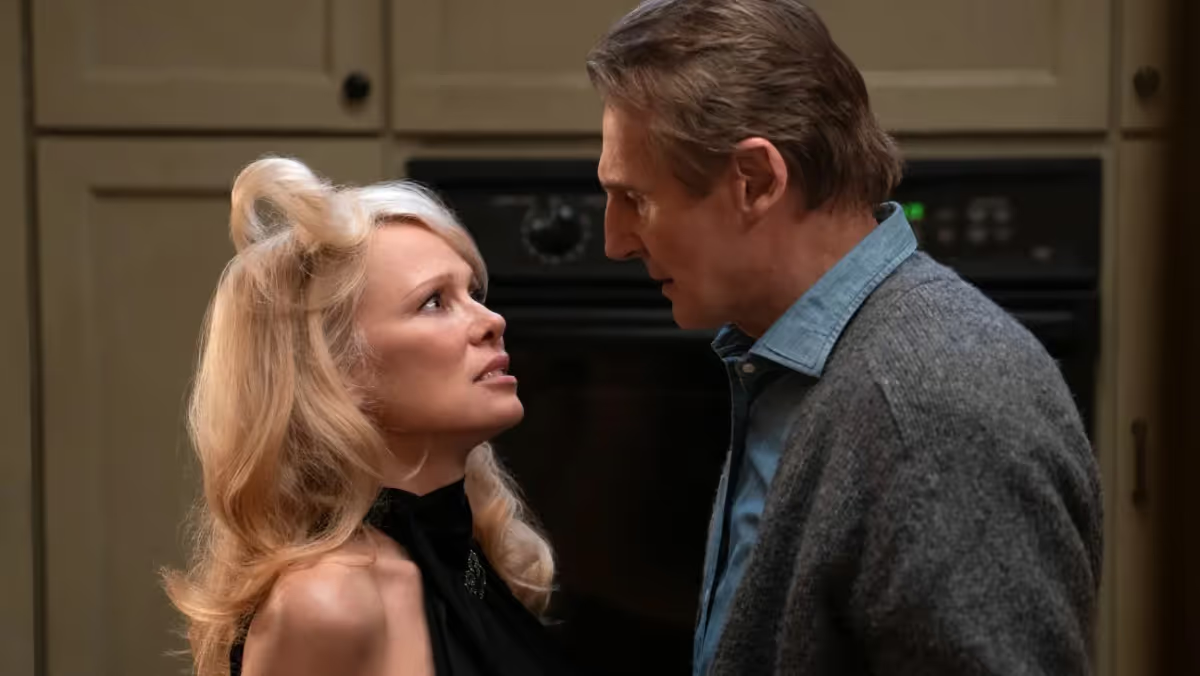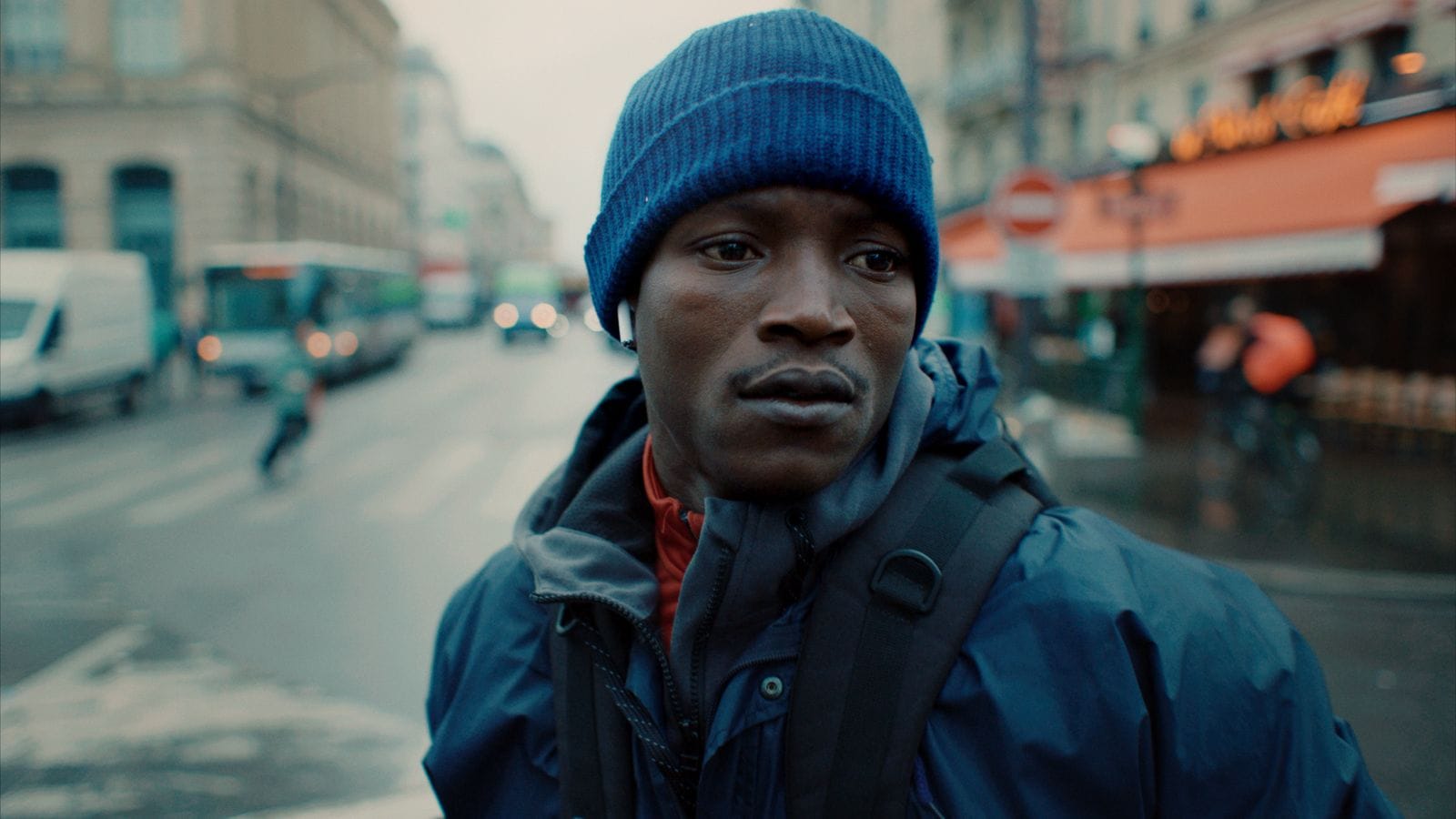In Review: 'The Naked Gun,' 'Together,' 'Souleymane's Story'
A classic spoof gets a 2025 makeover, a couple undergoes an extreme sort of bonding, and an immigrant from Guinea tries to find a foothold in France in this week's new releases.

The Naked Gun
Dir. Akiva Schaffer
85 min.
Reviving the spoof through a legacy sequel to The Naked Gun is an excavation project akin to Easter Sunday. The subgenre sputtered out on the diminishing returns of the Zucker-Abrahams-Zucker sequels with Leslie Nielsen (and the various ZAZ-less Nielsen vehicles, which were worse) and was then stabbed to death by the Scary Movie franchise and the work of Jason Friedberg and Aaron Selzer (Date Movie, Epic Movie, Meet the Spartans, etc.). Whatever lowbrow artistry that ZAZ brought to the genre through fourth-wall-breaking, genre parody, and gag-a-second silliness had collapsed into gross-out comedy and references to the previous year’s blockbuster hits. So the odds are stacked against director Akiva Schaffer, one-third of the great comedy troupe The Lonely Island, to resurrect the spoof a full 37 years after the original film, to say nothing of the minor side quest of securing the future of theatrically released studio comedies.
With the eternal spoof caveat that the jokes in The Naked Gun are hit-or-miss, Schaffer and his credited co-writers, Dan Gregor and Doug Mend, stay on the right side of the ratio and treat the franchise as more of a jumping-off point than a model to follow slavishly. There are scenes that knowingly evoke moments from the original, but others tailored around “the particular set of skills” of its leading man, Liam Neeson, and the old-guy action movies that have given his career a second act. The film also has a solid girding in satire that the ZAZ comedies largely avoided: Beyond all the stockpiled silliness, Schaffer and company update The Naked Gun for a world where tech elites and scam artists make for juicy villains, especially when squared off against a defiantly analog tough guy like Neeson.
Opening with a splashy downtown robbery sequence that’s like The Dark Knight meets The Three Stooges, The Naked Gun brings in the star cop of L.A.’s Police Squad division, Lt. Frank Drebin Jr. (Neeson), to go John Wick on the scene, but not before the most important item—a gizmo literally called “P.L.O.T. Device”—is smuggled out the back door. It takes some snooping for Drebin and his partner Capt. Ed Hocken Jr. (Paul Walter Hauser) to discover that the mastermind behind the operation is Richard Cane (Danny Huston), a tech mogul whose stature in the city echoes Ricardo Montalbán’s in the original. There’s a Priscilla Presley equivalent here, too, with Pamela Anderson as Beth, the sort of femme fatale that leaves Drebin narrating his life like Fred MacMurray in Double Indemnity. Her deceased brother worked in Cane’s company, so she’s poking into the case while canoodling with Drebin on the side.
Though Schaffer is accustomed to turning out jokes at a high volume—as evidenced by Hot Rod and especially Popstar: Never Stop Never Stopping—the spoof is an art in itself, and he’s clearly studied enough ZAZ and Mel Brooks to reproduce their rhythms and possibilities. There are foreground/background jokes, like a “cold case” room at Police Squad that’s just a walk-in freezer with files, and gags that poke at genre clichés, like Drebin breaking every phone he encounters into pieces. Schaffer also nods affectionately at the original by continuing Drebin’s habit of running into people and things with his car and offering a Herman’s Hermits-style romantic montage that veers off on a hilariously absurd tangent involving a sentient snowman.
Though The Naked Gun couldn’t quite be categorized as political comedy, the connections between Cane and a visionary Silicon Valley doofuses like Elon Musk and Peter Thiel are notably pointed. It turns out the P.L.O.T. Device has sharper teeth than a mere MacGuffin, digging into a brand of scammy tech utopia that’s about ruining the present in order to create a better world for the few. While that sort of commentary doesn’t turn The Naked Gun into a stealth satire per se, it does reflect a strong effort to bring the franchise into the present day rather than recycle old formulas. It’s too much to lay the fate of the studio comedy at the film’s feet, but the spoof comes away with a clean bill of health. — Scott Tobias
The Naked Gun starts saving comedy tonight in theaters everywhere.


Together
Dir. Michael Shanks
102 min.
At a going-away party for their move from the big city to a rustic home in the countryside, Millie (Alison Brie) surprises her long-time boyfriend Tim (Dave Franco) by getting down on one knee and proposing to him in front of their friends. She’s holding an imaginary box with an imaginary ring, which seems like a cute gesture for a cash-poor couple that can pick up real rings once they’re settled, but the symbolism is unmistakable, especially once Tim pauses for an eternity with his answer and only assents to rescue the whole room from an awkward scene. Their relationship has enough inertia to carry them to their new home, where Millie has accepted a teaching job and Tim can continue to nurse his fading musician dreams, but it seems like they’re delaying the inevitable. Breaking up requires too much effort, and it’s easier for Millie and Tim to keep talking themselves into believing things will change.
Written and directed by Michael Shanks, Together morphs quickly into body horror of impressively grotesque dimensions, but for better or worse, the relationship drama in that opening scene carries over. The film is one big, honking allegory for intimacy, to the point where even when Millie and Tim’s bodies literally tangle and twist against each other, the thematic significance of their coupling cannot be ignored. (And can, possibly, be large enough to see from outer space.) It is fortunate that Shanks’ screenplay also happens to be witty and he has actors in Brie and Franco who are seasoned comic actors with a lot of chemistry together. They’re the spoonful of sugar that makes the metaphor go down.
Fate presents a literal path for Millie and Tim once they move to a forest enclave and embark on a morning hike that, at the very least, brings an urgency to their relationship that it didn’t have before. Like typical urbanites, they detour down the wrong trail and fall into a spooky crevasse that seems to have a pulsating life of its own. While in the cave, their lower legs are bound by a weird sticky substance—Tim dismisses it as “mildew”—but this kind of physical connection intensifies once they’re back on the surface, joined by a psychic bond that acts as a magnetic force. They may be reluctant to commit, but nature has become a pushy matchmaker.
There’s an explanation for all this nonsense, linked to a local cult that ensnared the last couple that occupied Millie and Tim’s house. But the less time Together spends on this mystery, the more it can focus on a couple that’s having their relationship tested in a way that cruelly targets their weaknesses. The intimacy they struggled with before is now a unique torment where their bodies hungrily devour each other in ecstasy and pain. Their futility in trying to solve this problem together leads to some big laughs and more than a few gnarly setpieces, but Together struggles with the obviousness of its thematic agenda. Millie and Tim face a supernatural plot device that they—and we—are powerless to overcome. — Scott Tobias
Together is now playing in theaters everywhere.


Souleymane’s Story
Dir. Boris Lojkine
93 min.
Every day Souleymane (Abou Sangaré) spends in Paris requires him to thread one needle after another. A bike deliveryman for a DoorDash-like service, he has to make enough money both to sustain himself and to pay off Emmanuel (Emmanuel Yovanie), a fellow immigrant from Guinea who rents Souleymane his account while Souleymane waits for his asylum hearing. That takes time and money, too, thanks to Barry (Alpha Oumar Sow), who Souleymane pays to provide him with both papers establishing him as a political refugee and a fake history to back up the claim. Souleymane hopes this combination will be enough to allow him to leave the ranks of the sans papiers, immigrants without papers, and attempt to make a better life for himself in France. In the meantime, he has to make those deliveries, no matter how hostile or slow the restaurants he picks up from might be or what accidents he might have along the way, and catch a 10pm bus out to the crowded shelter that’s the closest thing he has to a home. It’s an exhausting struggle that might never pay off. It might even leave him worse off than before.
Written and directed by Boris Lojkine, Souleymane’s Story focuses tightly on Souleymane’s routine, in the process revealing both the precariousness of his existence and the wearying effect it’s having on his soul. The occasional act of kindness, like a free cookie from a friendly restaurant worker, brings a smile to his face. But it can’t offset the effects of a phone call with his ailing mother or news from his girlfriend Kadiatou (Keita Diallo) back in Guinea that she’s considering a proposal from an engineer. Both realize that as deeply as she misses Souleymane, she might have to accept it as a way to escape the same poverty that sent him to Paris and away from her. Lojkine uses practical locations and ground-level filmmaking to establish the rules and boundaries of Souleymane’s world, a kind of subterranean Paris in which he and others like him do their best to scrape together a living.
The title has several meanings. There’s the story Souleymane memorizes in an attempt to sway the immigration authorities that he should be allowed to stay, a prefab tale of woe, incarceration, and political oppression. (When he finally reaches the interview stage, Petit Maman’s Nina Meurisse plays the agent in charge of his case.) There’s the real story of how and why he came to Paris, which is no less affecting but outside of the parameters needed to obtain asylum. Then there’s the few days of Souleymane’s life we see in the film, in which he emerges as a kind, frustrated, complex, and fragile individual. (Sangaré’s understated performance is all the more remarkable for the actor’s previous inexperience; it was taking this job that helped secure his own papers.) The film makes it impossible for us to see him as just another name on a list for the government to place a “yes” or a “no” next to. Whether his undeniable humanity will have an effect on his fate is another question entirely, however. —Keith Phipps
Souleymane's Story opens in select theaters tomorrow.





Discussion